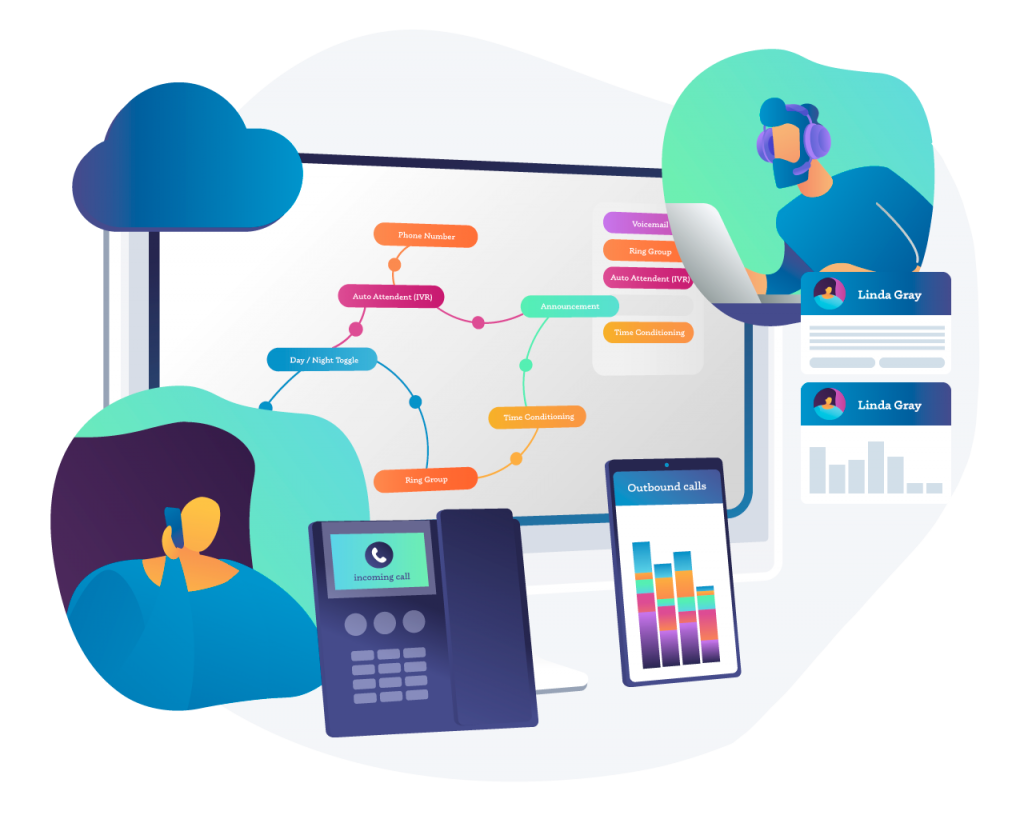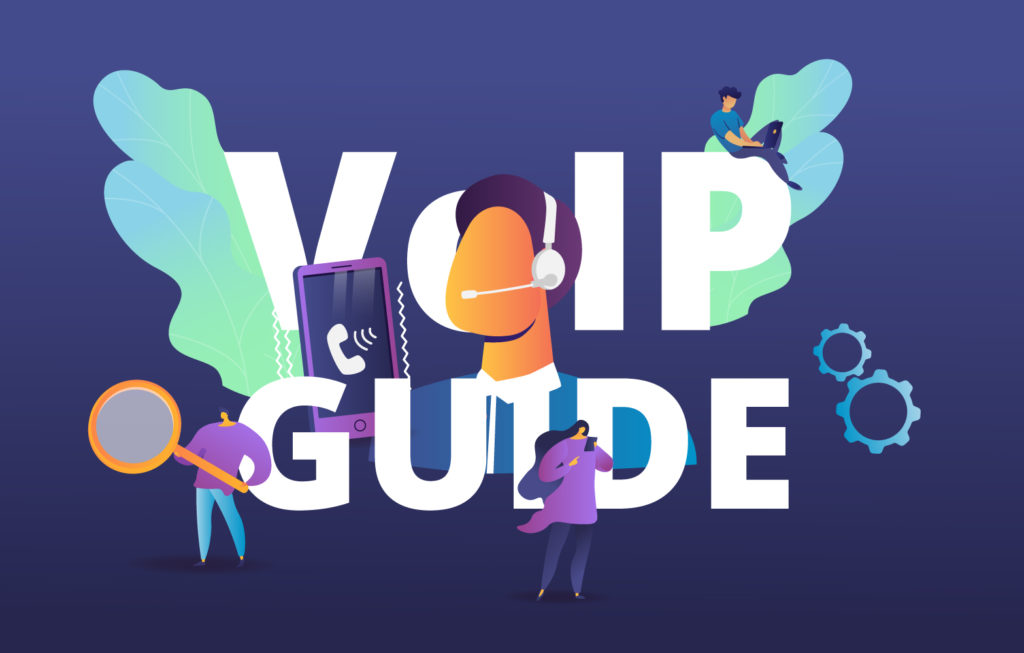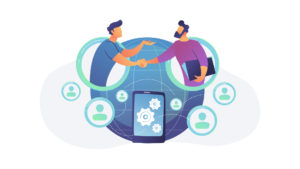VoIP stands for “Voice Over IP,” or “Voice Over Internet Protocol,” – but what does that mean? VoIP is a technology that allows you to make calls over the internet.
With our VoIP systems you can make a call on your desk phone, mobile, desktop computer, laptop or tablet, on any internet connected device!
This means you can use it anywhere, on any device! It’s not just about making and receiving phone calls, though. A VoIP phone service offers many other features including call forwarding, call recording and a plethora of reporting tools and statistics that will help your business understand your customers better and become more efficient.
In this article, we will cover these IP Phone features in detail. So, keep reading to find out if VoIP is right for your business.
What Is VoIP?
VoIP phone system is a way of transmitting voice calls over IP networks. It is a means of making phone calls using an internet connection, rather than making a call using a landline.
So, traditionally phone calls are made using telephone lines to carry voice between the two parties making a call. These lines are made up of a vast network of cross-country telephone lines and exchanges.
VoIP is enabled by a group of technologies and methodologies used to deliver voice communications over the internet. A VoIP service will convert a user’s voice from audio signals to digital data, then send that data through the internet. If another user is calling from a regular phone number, the signal is converted back to a telephone signal before it reaches that user.
How Does VoIP Work Exactly?
To accomplish this, your phone connects to your switch or router in your Local Area Network (LAN).
When you dial a telephone number, your IP phone tells your VoIP service provider to call the other party. The VoIP service establishes the call and exchanges data packets from your IP phone. The VoIP phone converts these digital signals back into the sound you can hear.
VoIP completely bypasses the traditional telephone company entirely. Wherever you have a broadband internet connection, you can use VoIP.
Types of VoIP systems
There are many different types of phone systems that use VoIP. They can be split into two main categories.
On Premises based hybrid phone systems
These systems are a blend of traditional phone systems and SIP channels, which is a form of VoIP using SIP (session initiation protocol). Call routing is programmed via the premise-based phone system, changes usually completed by a telephone systems engineer. Companies are happy with the existing non-VoIP system but want to take advantage of the cost and functional benefits of VoIP, so will continue to use both.
Cloud based systems (or Data centre based).
Instead of storing the network and routing elements of a business phone system somewhere in your office, cloud-based telephony takes everything offsite. This type of phone system is hosted in the cloud, which essentially means your data is securely stored on a server that can be accessed via the internet. They act as their own full-service phone companies that you control.
byphone is exclusively a cloud-based system that is hosted in many data centres. If one system encounters an issue or goes down another can take over immediately. This resilience is not possible with premises-based systems.

What Can VoIP Do for Me?
Having a clear idea of why someone might want to use VoIP is essential since it will help you understand if it would benefit them. Let’s look at some benefits:
Increased Accessibility
Cloud-based VoIP services let you make calls from anywhere using any device. All you have to do is add your device to the cloud network and route your calls. With the byphone VoIP solution all you need is a browser, and you can make instant changes to redirect your incoming calls to someone else or have the voicemails sent to your email.
This level of accessibility can be completed at both admin or user level, it’s especially helpful if you’re managing a mobile workforce. So, employees can make and receive calls regardless of their location.
Improved customer contact
Improve your organisations availability to customers by increasing the number of phones used when a customer rings the main office number. By creating a series of ring groups, you can widen the number of phones that ring after a period of time. You can even include other mobile phones and landlines in this ring group so that your phones never go unanswered.
Home working
With a system in the cloud all phone and IP devices can join the office system by logging in every day. With byphone you can toggle home workers into office ring groups thereby improving customer service the flick of a switch. You can add any number or device by just logging into the system and making a few quick changes to the ring groups.
Cheaper Calls
Compared to traditional phone lines, calls are cheaper on VoIP. Traditional phone calls are expensive because they use a network of dedicated copper wires between you and other callers, VoIP calls use the existing data networks to transmit the voice calls over the Internet in the form of digital data packets. A lower cost per call is a huge advantage if you often contact someone abroad. VoIP offers cheap international calls, so you don’t have to worry about racking up a huge phone bill.
Flexibility With Devices
Most people now use more than one type of device, be it a computer, tablet or mobile phone. Unified communications are created with VoIP. You can use whatever type of phone or device is convenient for you at the time while still getting access to all your calls and messages.
No more missed calls
Improve an organisation with byphones detailed call analytics. By understanding how your team is performing on inbound and outbound calls, make big changes through our simple call flow
Security
Great security has many layers, byphone VoIP has been designed with fraud prevention at it’s core. Our real time rating engine provides our end-users with optimum security by monitoring call patterns, credit used, time, and numbers called to name a few.
Convenience & Trust
Receive calls on multiple devices with a single number and make calls from your business phone number anywhere. This is convenient for those who work from home and need to sustain the brand trust with customers.
Are there any disadvantages to VoIP?
It is still a relatively new technology, the first VoIP technology was released in 1995, so improvements are still ongoing. Those improvements, together with advances in internet connectivity and changes in the way businesses work, make VoIP more relevant today than ever before. The system has developed to the point that its advantages significantly outweigh its drawbacks.
Will you experience Loss of Call Quality?
This is a long-standing question in relation to VoIP. Cloud-based telephony is entirely dependent on the internet, meaning that you will need a reliable, high-quality internet connection with sufficient bandwidth availability to make phone calls. VoIP doesn’t work well on dial-up or satellite-based internet connections. You’ll need at least 100 kbps (0.1 Mbps) per phone line.
In fact, you can watch the video below from the byphone Managing Director explaining how you can mitigate call quality problems.
A strong and reliable internet connection is required to ensure call quality. During your three-month free trial with byphone you can follow our Best Practices for Using VoIP guide and thoroughly test your internet connection for peace of mind on call quality.
Best Practices for Using VoIP
Now that you know more about VoIP and what it can do for your business, it’s time to learn how best to use this service.
VoIP is susceptible to network congestion, resulting in echoes, lag, and dropped calls. VoIP relies on data packets arriving at their destination and in the correct order. High latency and jitter can cause problems with phone calls. Making sure you have a sound foundation by following our steps below can help eliminate these issues.
Check Your Internet Connection
As we’ve mentioned, VoIP doesn’t work well on dial-up or satellite-based internet connections. You’ll need at least 100 kbps (0.1 Mbps) per phone line.
You can use the byphone dedicated testing tool to measure the quality of your connection. This will allow you measure your voice quality on the data network over time. The tests will identify whether you need additional capacity.
Test your LAN and WAN connections regularly.
Track your key metrics like ping, jitter, and bandwidth to detect network congestion. Voice over Internet Protocol uses 100 Kbps upload/download per line.
Set QoS (Quality of Service) rules that prioritize your VoIP traffic on all your network.
By default, routers handle data packets following a First In First Out (FIFO) order. This can create queuing issues across your network when bandwidth use is high. QoS solves this by dedicating network resources based on the type of traffic and device, improving reliability and clarity of your phone calls.
Use wired Ethernet connections.
Wi-Fi is subject to interference, which can impair phone calls at the worst possible time. By plugging in a cable, your packets of data travel uninterrupted to your router, and then out over the internet.

Get the most from your 3-month Free Trial
During your three-month free trial, you can connect all your staff to the VoIP system. During the trial you can book time with the byphone team to refine your phone system to meet your requirements exactly.
The drag and drop technology built into this system means that anybody can create the inbound call routing for even quite complex organisations. You don’t need to depend on a phone company. This allows the organisation to adapt their inbound call management quite easily and quickly. Ad hoc and temporary changes can be made to suit even daily changes to staff availability.
Reach staff wherever they are
The main benefit of using byphones VoIP system is your business can receive calls on practically any device. People working from home or out in the field can effortlessly join any ring group.
Each person has multiple devices, so certain devices such as a desk phone can join a ring group while others such as a mobile can stay out of it. Easy to change at the click of a button so you can play around with the call flows until you find the optimal set up.
Get the data, make the change
Empower management to improve your organisation with byphone’s call reporting. Give management and users access to call analytics in an easy to digest format, no manual needed. Our easy-to-use graphing tools, immediately give the management team the information they need to focus their energy on and improve the businesses.
You have the data, now what do with it? Our drag and drop call flow, allow managers to easily make changes to how their team are handling calls. Missed calls on Friday, within 3 clicks add a new user to answer calls on Fridays. It’s really that simple.
Our VoIP call reporting is so easy to use, no manual is needed.
Don’t Forget About Video Chats
byphone VoIP allows you to run most of your office on a cloud-based phone system while giving some of your user’s phone system access via Microsoft Teams. All users in an office can collaborate sharing messages, content, and video. The byphone integration allows those teams users that need to make calls from their teams account to do so using their teams account as one of their devices on the main office system.



